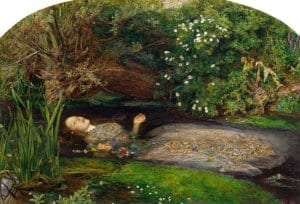Camila Machado
Minas Gerais, Brazil
 |
| Ophelia, 1851 John Everett Millais. Oil on Canvas. Tate Britain, London, United Kingdom |
The opposite of depression is not happiness, but vitality.1
– Andrew Solomon
Vitality had seemed to seep away from me through the years, stopping me from feeling joy, sadness, affection, and love. I felt empty but somehow managed to continue living, insisting on existence. Everything seemed too much work. Instead of being thrilled to talk with my friends on social media, I would think, “What a lot of people that is to have to answer back.” Or I would decide to have lunch and then think that putting the food on a plate, cutting it up, chewing and swallowing it felt like a big sacrifice. And while I knew this was ridiculous, that most people manage to read their messages and eat lunch and organize themselves, I was still unable to figure a way out of depression. I began to think it was just too painful to be alive, or that I should not have been born into this sea of suffering. I would not have minded dying, but did not want to kill myself and hurt other people. I still saw life as not worth living, and thought I would always feel empty and never satisfied or happy.
Melancholy has been recognized in human beings since ancient times, before modern medicine existed and drugs were available for treatment. The definition has changed since the days when Hippocrates defined the human body as a mixture of four humors: blood, phlegm, yellow bile and black bile. People affected by melancholy were thought to have an excess of black bile in their bodies. In the Dark Ages, melancholy was seen as punishment from God or possession by demons. But during the Renaissance, melancholy was almost glamorized as a gateway to creativity. Many great artists were thought to have the condition, which was believed to be a sign of intelligence and sensitivity. The character of Ophelia in Shakespeare’s Hamlet is perhaps the most famous melancholic of all. Famous historical figures such as Maria Leopoldina, the first empress of Brazil, also expressed melancholy: “I have for some time been in a really black melancholy,”2 and in a confession to a friend, “Behold, it is not a single moment that passes without my regretting that I have been deprived of your company, a true consolation in times of melancholy, to which I, unfortunately, have too many reasons to be subject.”3
In the seventeenth and eighteenth centuries, religious definitions of melancholy and depression were replaced by scientific ones, although it was the responsibility of the patient to maintain his own mental health. In the nineteenth and twentieth centuries, surgical lobotomies were used to destroy the patients’ frontal lobes of people’s brains in order to calm them, but this often led to personality changes, coma, or even death.
In 1952 it was found that the tuberculosis drug Isoniazid seemed to help alleviate the symptoms of depression, and scientists began looking to drug therapy. Today depression is thought to be caused by many factors, and is now recognized as a disease. It is different from simply feeling sad, since all people feel sadness at some point during their lives.
To be diagnosed with depression, a person must have a depressed mood or loss of interest as well as other symptoms such as weight gain, fatigue or loss of energy, insomnia, feelings of worthlessness or excessive guilt, trouble concentrating, agitation, or thoughts of suicide or self-harm. These symptoms must last for at least two weeks in order to diagnose depression.
Depression can be treated using cognitive behavioral therapies, medications, or a combination of both. While the recognition of melancholy is old, the treatment for depression is pretty new. Everyone needs to follow their own path for the right solution. To feel disconnected from your body hurts, but at some point I learned to love this part of myself as something that has taught me to see the world through another veil. I learned to let go of my pride and admit that I could not do it alone. Everyone needs someone else. Even if there is never a cure for depression, we can learn how to live with it by keeping a mind full of hope and help. For “mental health is just as important as physical health.”4
References
- Andrew Solomon, “The opposite of depression is not happiness, but vitality.”
- Maria Leopoldina of Austria, “I have for some time been in a really black melancholy.”
- Maria Leopoldina of Austria, “Behold, it is not a single moment that passes without my regretting that I have been deprived of your company, a true consolation in times of melancholy, to which I, unfortunately, have too many reasons to be subject.”
- Kate Middleton, ”Mental health is just as important as physical health.”
CAMILA DE JESUS AQUINO MACHADO is eighteen years old and will soon be attending college. An avid learner, she has been learning English and Japanese in her spare time.
Winter 2018 | Sections | Psychiatry & Psychology

Leave a Reply